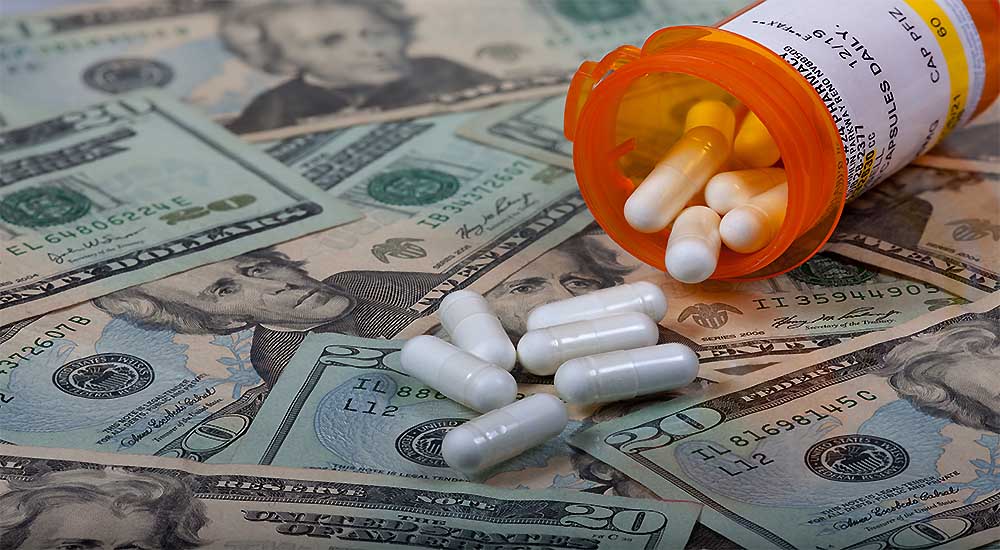3 Reasons You Pay More For Drugs Than The Rest Of The World

Why are drugs so expensive?
Does it frustrate you that drug prices are so high?
Are there any alternatives to drugs you’re not being told about?
Specialty drugs can cost $100,000 per month or more – even a 10% co-payment would cost you $10,000 per month. Can you afford that?
When drugs are not optional
Sometimes you need to take a medication. If your blood pressure is extremely high, you just had surgery and are trying to avoid a life-threatening blood clot, or you need insulin to stabilize your diabetes, drugs can be lifesavers, no argument.
If you live in the U.S. you are paying more for prescription drugs than anyone else in the world.
Why?
It all began with an agreement between our government and the pharmaceutical companies. In order to support them and provide needed funds for research, we (our government) agreed to pay higher prices for our drugs.
Alert: Read my blog “Is your insurance company making your healthier or keeping you sick” to learn how your insurance company and the pharmaceutical companies both profit from this agreement. You don’t, but they do.
What do Canadians pay for their drugs?
What if you lived across our northern border in Canada? How much less would you be spending on your medication?
Let’s compare a few drug costs between the U.S. and Canada:
Drug Cost in U.S. Cost in Canada
| Effient 10 mg – helps prevent blood clots $12.59/pill $2.26/pill | |
| Humalog Insulin 100 units/ml – diabetes drug $12.47 $2.13 | |
| Pradaxa 150 mg – helps prevent blood clots $ 5.64 $1.36 | |
| Spiriva 18 mcg – treats lung diseases $10.98 $1.79 | |
| Xarelto 20 mg – treats atrial fibrillation $11.60 $2.34 |
If you’re a pharmacy in the U.S. you are paying 4 to 6 times more than our northern neighbor for the same drug.
As a U.S. citizen, how much more are you paying for your drugs?
You the patient, of course, are paying more than your pharmacy. Let’s look at the numbers:
Xarelto, the last drug on the list above costs a U.S. pharmacy about $350 per month to purchase, while the patient will be charged $520 per month. Okay, everyone gets to make a profit, that’s fine.
But, you can get it 7 times cheaper from a Canadian pharmacy – about $70 per month. Same manufacturer (Bayer), same drug, same dosage – all for a price 7 times less than you are being charged here in the U.S.
Are pharmaceutical companies less profitable, therefore?
Keep in mind the $2.34 the Canadians are paying per pill still represents a profit to the pharmaceutical company.
How do we know they’re making a profit? When you look at the price of generics, a drug whose patent has elapsed, it’s easy to see the actual cost of manufacturing – and it’s typically just a few cents.
Therefore, while the $2.34 per pill “sounds” cheap when you compare it to the $11.60 the U.S. pays, it still represents a hefty profit margin to the pharmaceutical company.
So why are we the “fools” who agree to pay so much more?
The drug companies tell us the extra funds are used for research. Is that true or false?
Would pharmaceutical research stop if we ceased paying so much more for drugs?
To best ascertain what pharmaceutical companies are paying towards research you simply look at their annual financial statements. As publicly traded companies they are required to provide such data.
Thank you to David Belk M.D.
David Belk MD & Paul Belk Ph.D. did the hard work for us, examining annual reports for twelve of the largest pharmaceutical companies over a thirteen-year period: 2003 to 2015.
The pharmaceutical company’s true research costs are revealed…
What’s your guess?
Do pharmaceutical companies spend more on research or advertising?
What’s the bigger number: profit or cost of research?
Pfizer’s revenue was $67 billion in 2011 and they spent about $9 billion on research and development – that’s 14% of their income.
There’s no arguing that $9 billion is a lot of money, but they spent more than double that amount on marketing – $19 billion. And their profit was $10 billion after taxes – more than they spent on research.
As you’ve likely guessed, the other pharmaceutical companies followed suit: the combined income for all of them was $5.35 trillion, and their profits combined to $1.05 trillion.
Did the amount spend on marketing? $1.59 trillion.
How much was spent on research? $887 billion.
Did you guess correctly?
Big Pharma makes more in profit than they spend on research, and their marketing budget dwarfs what they spend on research by a factor of two.
Clearly, much of what you pay for in the high cost of drugs is for the expensive commercials, magazines, and online ads so pervasive in our society, not for research.
Since it’s clear that the cost of research is half of their marketing budget and less than their annual profits, why is that we in the U.S. have to pay so much more for our medications?
How does the rest of the world get away with paying less?
The rest of the world bargains with pharmaceutical companies, knowing that a drug company would rather lower their price than have their drug be excluded from a country as a whole.
As a citizen you have no bargaining power in this scenario, it’s the government that makes the bargain for its citizens around the world – a bargain that’s made everywhere but here.
The U.S. is the largest market for medications on the planet putting us in a perfect position to effectively bargain, but we don’t.
Why doesn’t our government fight harder for us?
U.S. law prohibits the bargaining that other countries do as a matter of course. We are told it’s because drug companies need “help” to handle their hefty research costs, but as you saw above, we have now disproven that – it’s just not true.
What can you do to avoid high drug prices?
- You can order your drugs online from reputable international pharmacies.
- You can ask your pharmacist if it’s less expensive for you to go through your insurance or pay cash. Often, you save money by paying cash for your prescription.
- You can avoid drugs by using your ultimate weapon, getting healthy.
How you can avoid drugs altogether
We successfully wean patients off medications. Drugs for high blood pressure, high cholesterol, diabetes, and depression, to name just a few, are no longer needed once the true root cause underlying the condition has been identified and treated.
Imagine no longer needing a daily medication because your body is no longer manifesting the disease or condition.
Sound too good to be true? It isn’t. In fact, it’s a daily occurrence here at Root Cause Medical.
If you’re ready to regain your health, we’re ready to get you there.
There’s no magic wand. You will need to change your diet and lifestyle. But the result is reclaimed health without drugs.
That’s exciting and it can all happen in just a few short months.
Do you need help with your health?
We have the diagnostic and testing tools, the clinical experience, and a different medical approach to discovering the root cause of why you have the symptoms that are bothering you. As long as you are ready to make some dietary and lifestyle changes, we can help you. We will "hold your hand" through the changes, step by step, to make each step an easy one. We are located in Clearwater, FL, at 1000 S Ft Harrison, at the corner of Ft. Harrison Ave. and Magnolia St. There is plenty of parking space directly accessible from Ft Harrison. If it is not convenient for you to come to Root Cause Medical Clinic, we offer telehealth/telemedicine consultations to residents of certain states. Call us for details.
Contact us for a Consultation – Call 727-335-0400

Dr. Vikki Petersen DC. CCN
Founder of Root Cause Medical Clinic
Certified Functional Medicine Practitioner
Dr Vikki Petersen is a public speaker, author of two books, several eBooks and creates cutting edge content for her YouTube community. Dr Vikki is committed to bringing Root Cause Medicine and its unique approach to restoring health naturally to the world.
Ask a Doctor
Have a health concern you'd like to speak with a doctor about? Or just want clarity on a subject? Ask Us!


